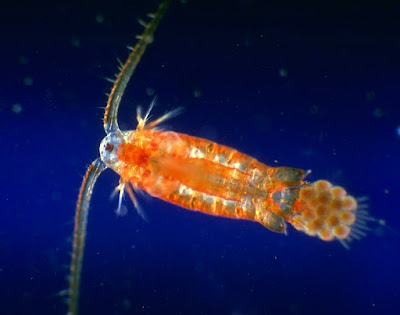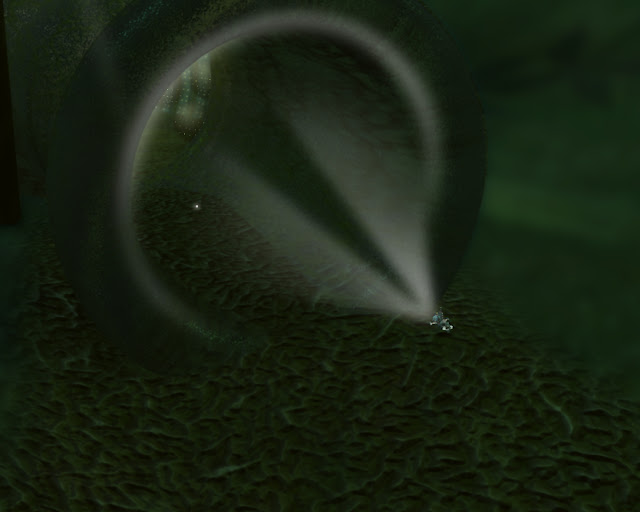The Age of Discovery, Chapter 4: Full Reverse!
1755 hours...
I awake to a throbbing head and
Lyra’s concerned face shifting into focus.
The bell from the engine order
telegraph signals that we are in “emergency full reverse.” Leaning into the tilting deck, I climb
to my feet while about our
condition. Gyro reports that we’ve
been pulled off course by a current of overwhelming veracity.
“Can you steer us out of the
current?” I ask with alarm of my wheelman.
“Sorry, Skipper,” shouts Gyro. “We aren’t getting enough bite against
the rudder to turn in this hell current.”
“Set her to rights if you can, Mr.
Gyro, and hold position against the current.”
“Aye, sir,” answers the steersman.
With aching slowness the deck
becomes level. By holding position
in the smoother current we are graced, thanks to Gyro’s skills, a reprieve from
the previous turbulence. Now we
can get a look at the source of the strange powerful current –the feeding
vortex of a monstrous copepod, the same species as the one we had seen from a
distance. This one has bested our
efforts to avoid such navigational hazards.
The monstrous crustacean fills the
forward windows, drawing everything around it into its mouth. The only silver lining to being trapped
in its feeding vortex is the opportunity to observe the copepod’s fan-like
mouthparts terrifyingly up close. These
fan-like appendages, beating furiously, create a current in the surrounding water,
drawing in a variety of single-celled organisms, such as algae cells. Countless green protozoa tumble
past our windows in a steady stream, disappearing into the copepod’s
mouth. Due to the monster’s
translucent exoskeleton we are treated to a fascinating view of its well-packed
gullet and the microorganisms digesting in its stomach. We are safe for the moment, holding fast
against the feeding current. I feel
fortunate that we find ourselves in a better predicament as the tragic
phytoplankton.
I glance at the engine temperature
gauges, and find it troublesome that the levels are quickly rising. Back in the engine room Barron is
coaxing extra power from his boiler to hold our position against the current,
but the strain on the engine is beginning to show. A moment later comes the call from the engine room I have
been dreading.
“Skipper,” comes the voice of our
Engine Master over the voice pipe.
“The combustion chamber is overheating. I can’t pump water through it fast enough to lower the temperature. We need to break out of this current
and let the engine cool down, or it’s going to seize.”
“Jonathan!” shouts Lyra, looking up
from her field journal, her face animated: “Remember our observations from
earlier? We’ve seen what happens
when something larger than the animal’s normal food gets caught in its vortex
fans. The animal stops feeding,
and takes a moment to remove the object.”
From his station at the ship’s
wheel an excited Gyro offers a suggestion. “Skipper, we can use hydro cohesion! At this scale, the surface of an air
bubble is just a ball of surface tension.
It might as well be a solid object. If we can make a nice big air bubble it might make
that beast pause for a few seconds.”
“Barron,” I call through the voice
pipe, “execute an emergency purge of our CO2 holding tank! “
“Aye, skipper,” he calls back.
The deck lurches as the gas empties
from the ship, momentarily throwing off her trim. Through the windows an undulating bubble emerges from
beneath the Cyclops and is immediately
caught in the vortex, whirling away.
It falls toward the copepod’s mouth. We don’t wait long to see if our plan has succeeded. Our CO2 bubble lodges like a
boulder in the copepod’s fan-parts.
The appendages halt all movement.
The current ceases. The
ship lunges in reverse.
I shout into the voice pipe:
“Engine master, full ahead! Pilot,
get us out of here!”
A moment later, the copepod
reverses its fan-parts, dislodging the bubble. As if nothing had happened, it resumes its feeding current –
but by then we are on our way, and safely out of range of its deadly vortex.






Comments
Post a Comment